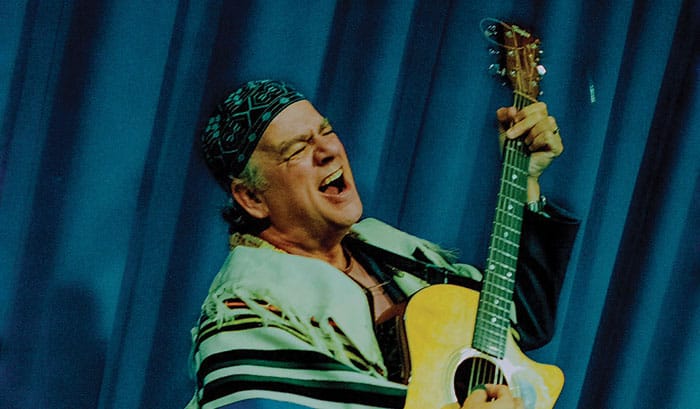 Rabbi Jason van Leeuwen
Rabbi Jason van Leeuwen Stately and traditional looking, the century-old building housing Temple B’nai Hayim is tucked in a quiet residential Sherman Oaks neighborhood and could easily be missed. For the past 11 years Rabbi Jason van Leeuwen — rabbi, cantor, chaplain, vocalist, composer, producer, actor, director, activist and, most recently, opera performer — has been the face of the Conservative temple.
Known to his congregation as Reb Jason, van Leeuwen has taken a rather twisty path to the rabbinate. While he grew up in what he called a conventional Conservative household in Utica, N.Y., young Jason’s world was rocked when his parents divorced when he was nine years old. An even bigger shock was his father’s remarriage to a devout Irish Catholic woman with children of her own. It was a life-changing event for young Jason. “We stopped keeping kosher when I became part of a blended family,” he said. “I ate everything. I remember having a ham sandwich on a piece of matzah on Passover.” What made things even tougher was that his father and stepmother “wanted us to find our own way.”
Some of his new relations tried to tip the scales. “People on my stepmother’s side of the family would give me literature,” van Leeuwen told the Journal. “When I was in the sixth grade, my Uncle Fred, a wonderful man, gave me a comic book. Lots of mentions of Jesus on many pages.” The future rabbi stood firm. “Even then I said I am Jewish, I am happy being and staying Jewish.” What his new relatives did and said was never a threat to his personal identity. “I was very self-motivated to find my place in the universe through the lens of Judaism,” Reb Jason says.
Talking about this brings up an affectionate memory Returning home for Thanksgiving during his freshman year was at the Jewish Theological Seminary (JTS), a joint program with Columbia University, “and my Irish Catholic step-grandmother gives me a kiss and says ‘I am so proud of you.’” What he did not know then, she had prayed that he would convert to Christianity until she died. It was, he said, “the weirdest thing about my step-grandmother of blessed memory.”
Even with all the mixed signals, van Leeuwen thought about becoming a rabbi while still in high school. A trip to Israel helped him make the decision to enroll with JTS. The clincher came in 1986, at the funeral of his stepmother, who died of cancer when she was 49. “My father was devastated,” Reb Jason said. “All of us were. The funeral was in her church. My dad asked me ‘Could you do something Jewish?’”
So the future rabbi, 21 years old, stepped up to the altar of a Catholic church, put on a yarmulke, opened a siddur, and recited memorial prayers in Hebrew and English. When he came down the altar steps, it seemed as if the whole church was in tears. “The funeral director comes to me. He said he was so moved by what happened. He tells me he was born Jewish, and he converted to Catholicism when he was 14. I apparently awakened something in him. What did I do? All I did was read some stuff.”
Thirty-seven years later, he said the scene “was a microcosm of how our family got together — if we can flourish and remain close through all of this, maybe there is hope for others.” It was also a revelation for van Leeuwen, as he realized the power of ritual and of prayer. A piece of him was reawakened. Religion was a powerful tool for redemption, he concluded. “This is what I have to do,” the future rabbi told himself. He has never looked back.
After graduating from Lee College (what is now American Jewish University), he was ordained and earned a master’s in Hebrew letters before coming back to Los Angeles in 1998.
“Married a born and bred Angelina,” the father of two sons said, “and so we became more rooted here.” His mother had moved to L.A. when van Leeuwen was 11; they spoke by phone every week.
Given his colorful past and larger-than-life personality, it might be a surprise that he leads a small community. But not to Reb Jason.
“There is something to be said for small congregations. Intimacy. When people walk in, they are welcomed. I get to know everybody.”
“I love this shul for a couple reasons,” Reb Jason says. “There is something to be said for small congregations. Intimacy. When people walk in, they are welcomed. I get to know everybody. And I get to do other things. I also am a hazzan, some chaplaincy, I have done opera, acting. Composing is my major hobby.”
As the rabbi-cantor of Temple B’nai Hayim, Reb Jason calls himself “the Ranter. I am personally involved in everything. I tutor the kids—in how many congregations does that happen? Not common but it’s de rigueur here.”
When B’nai Hayim merged with North Hollywood’s Congregation Beth Meier in 2017, both shuls were struggling. Rabbi Richard Flom of Beth Meier (now retired) asked, “who will be the rabbi?” “You,” said Reb Jason, “I will be the hazzan.” Why? “People don’t understand how much more fun it is to be a cantor than a rabbi.”
Fast Takes with Rabbi van Leeuwen
Jewish Journal: What superpower would you like to have?
Rabbi von Leeuwen: Insightful listening.
J.J.: The best you ever have read?
Rabbi von Leeuwen: The book I am reading now is ‘Genghis Khan and the Quest for God’ by Jack Weatherford.
J.J.: What do you do on your day off?
Rabbi von Leeuwen: Run about three miles a day.
JJ: What would you be if you weren’t a rabbi?
Rabbi von Leeuwen: “David Bowie.”























 More news and opinions than at a Shabbat dinner, right in your inbox.
More news and opinions than at a Shabbat dinner, right in your inbox.